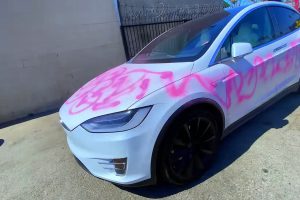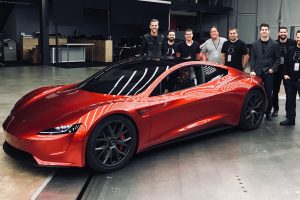How much cheaper is it to drive electric than to burn dinosaur juice? Some cite a rough rule of thumb that the per-mile cost of driving an EV should be about a third that of an ICE vehicle. However, that’s a very rough rule indeed—your real-world savings will depend on your choice of vehicle, your local electricity cost, and a host of other lesser factors.
As is the case with fossil vehicles, the efficiency of EVs varies widely. Driving a larger and/or higher-performance vehicle will cost you more per mile. Or will it? When it comes to EVs, we find that there’s a lot of difference in efficiency among brands. According to official EPA figures (see fueleconomy.gov), the 2019 Tesla Model X Long Range uses 35 kilowatt-hours of electricity to go 100 miles, which is far more efficient than the 2019 Jaguar I-Pace (44 kWh/100 miles) or the 2019 Audi e-tron (46 kWh).
It’s no surprise that the 2019 Tesla Model Y Long Range AWD is more efficient than the larger Model X, at 28 kWh/100 miles. However, some may be shocked to find that the Model Y equals the efficiency of the Chevy Bolt EV (28 kWh/100 miles), and actually beats that of the Nissan LEAF (30 kWh). These are both fine vehicles, but the Model Y is considerably larger and better-equipped, so there’s a good argument to be made that the Tesla delivers more automotive bang for your energy buck, partially offsetting its higher purchase price (but that’s a subject for another article).
The second major factor that determines your cost of driving is the cost of electricity in the locality where you live and drive. According to the US Energy Information Administration, the average residential price in the US as of June 2020 was 13.28 cents per kilowatt-hour, but the regional variation was wide: 9.5 cents in Louisiana; 9.92 cents in hydropower-rich Washington; 23.85 cents in Alaska and a hefty 29.03 cents out in Hawaii.
Calculating the cost of charging your EV can get much more complex. Some fortunate souls live in regions where the local utility offers time-of-use (TOU) pricing, which offers a discount for charging during off-peak times. Furthermore, so far we’ve only considered the cost of charging at home. Those who take a lot of long road trips may need to depend on DC fast charging, which can be pricey (but still usually cheaper than filling up with gas). On the other hand, if you’re one of the early Tesla owners who enjoys free Supercharging, you may actually be saving on fill-ups when you’re on the road (but be considerate of your fellow drivers, and resist the temptation to use free Supercharging for everyday charging).
If you want to compare the cost of electrons to the cost of gas, you’ll also have to take into account the local cost of fossil fuel. According to AAA, Americans are currently paying an average of $2.22 per gallon, but that varies from a low of $1.88 in Mississippi to a high of $3.24 in California. High electricity prices often correspond to high gas prices (Louisianans are paying $1.91 a gallon, and Hawaiians are shelling out $3.22), but not always. For example, Washington has low electricity prices, and fairly high gas prices ($2.83/gal), so the comparative savings of driving electric there are extra-attractive.
Another factor to consider is that, whereas electricity prices tend to be fairly stable, gas prices can bob up and down in response to all kinds of natural and man-made disasters.
If all this is starting to sound a little too complicated, you may prefer to take a look at the rough-and-ready cost calculations offered by Kelley Blue Book in a recent article. KBB’s Nick Kurczewski consulted noted EV guru John Voelcker, who explains how to get a general idea of what you’ll pay to drive electric. Brooke Crothers, writing in Forbes, also offers up some very rough cost examples.
Maybe you’re an analytical type, and will want to plug all the pertinent figures into your own custom spreadsheet, to be updated on a weekly basis. Perhaps you’re a more easygoing soul, who just wants to get a general idea of what you can save by getting off the gas. Then again, you may only be looking for a little more ammunition to justify spending a bundle on a snazzy new ride. In any case, there’s no question that you will be paying less to get around once you make the switch.
Original Publication by Charles Morris at EVANNEX.
Want to buy a Tesla Model 3, Model Y, Model S, or Model X? Feel free to use my referral code to get some free Supercharging miles with your purchase: http://ts.la/guanyu3423
You can also get a $100 discount on Tesla Solar with that code. Let’s help accelerate the advent of a sustainable future.





